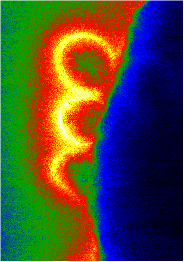Seeking Low dimensional metal/oxide composites and their optical properties: An International collaboration with Laboratorie de Physique des Solides/ CNRS, France
Source: Dr. Jenn-Ming Song (Director of i-Center for Advanced Science and Technology, NCHU)
Conducting the Research
Noble metal nanoparticles and their optical properties originating from localized surface plasmon resonance (LSPR) have been the subject of considerable interest during the past decade owing to their wide range of applications. Thanks to the MOST-BFT ORCHID project, a research team comprising the experts of materials synthesis, physical properties and electron microscopy from Taiwan and France has devoted to study LSPR of multi-dimensional nanostructures incorporated with various metal and oxide materials. In collaboration with Dr. Mathieu Kociak and Dr. Alexandre Gloter from Laboratorie de Physique des Solides/CNRS France, as well as Professor Shih-Yun Chen in National Taiwan University of Science and Technology, Professor Jenn-Ming Song developed innovative zero-and three-dimensional plasmonic nanocomposites, including multi-oxide coated nanowires enabling tunable LSPR, and hollow nanocomposite as 3D magnetically-controllable SERS substrates. Research results have been patented both in Taiwan and U.S., and published in Journal of Materials Chemistry, Nanoscale, Chemical Communications, Applied Surface Science, Nanomaterials, etc. Further development and applications are in progress and are expected to be published in the near future.
One of the key researchers, Dr. Jenn-Ming Song, is a professor in the Department of Materials Science and Engineering at National Chung Hsing University. His research interests encompass advanced interconnect materials, synthesis and applications of nanomaterials, as well as phase transformation and mechanical behavior of materials at bulk and small length scales. He has been an Editor for the journal Materials Chemistry and Physics since 2014. He serves as editorial advisory board member of Microelectronics Reliability and also guest editor of three special issues. Professor Song has received several excellent research awards, including the Ta-You Wu Memorial Award from National Science Council of the Republic of China (Taiwan) and the outstanding research professor award from the Lee Chang Yung (LCY) education foundation.
“Bonding” of CNRS and MOST
The Centre National de la Recherche Scientifique (CNRS) is the largest research institute in France and receives its research funding from the government. In 2001, The Ministry of Science and Technology of Taiwan (MOST) signed a cooperation agreement with CNRS to jointly subsidize numerous exchanges and collaborative research projects between Taiwanese and French scholars and researchers. Since then, CNRS has become the longest-standing partner of MOST in France. Given the superior quality and cultivation of Taiwan's tertiary education, the rapid aggregation of developments in the area of science and technology, and the human and financial resources invested in research, deepening scientific cooperation between Taiwan and France has always been a mutual and ultimate priority for both countries.
With an average of about 160 cases of research per year, The Ministry of Science and Technology of Taiwan (MOST) regards France as its second largest partner all along after the United States in terms of the collaborations of diverse areas was thrivingly conducted. Several Taiwan-France Science and Technology Cooperation Framework programs have thus been established. The joint cooperation agreement between MOST and CNRS includes: International Emerging Action (IEA), International Research Network (IRN), International Research Projects (IRP), and International Research Laboratory (IRL). Essentially, the main purpose of these programs that aims at facilitating exchange of researchers, encouraging joint scientific research projects, and the organization of seminars (or webinars) is to create a profound influence in academic research for Taiwan and France.


From left to right: Prof. J. M. Song (NCHU), Prof. S. Y. Chen (NTUST) and Dr. A. Gloter (CNRS)


Ag nanoparticles on CeO2 hollow spheres and surface plasmon resonance due to hot spot effect (Nanoscale, 11, 3572, 2019)








